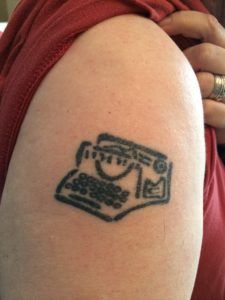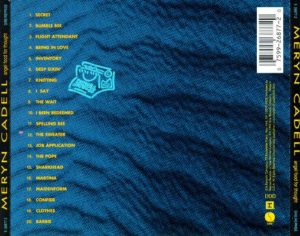As the Lethe Press website says, Heiresses of Russ reprints the prior year’s best lesbian-themed short works of the fantastical, the otherworldly, the strange and wondrous under one cover. With that in mind, I’ve asked author A.C. Wise to come share some thoughts on the anthology and her wonderful story, “The Devil Comes to the Midnight Café.”
What do you think we achieve by categorizing stories, tagging them with qualities that highlight sexuality (or gender, ability, and race) ? Is it a desired end point? A necessary stage on some collective journey humanity is taking?
I tend to think of it as a necessary stage. Unfortunate as it is, narratives centering the straight, white, neurotypical, cis male experience are still seen as “the norm” and they dominate the majority of our media – in print, on screen, and otherwise. The argument can be made that labeling something as lesbian fiction is othering, but the fact is, lesbians have already been othered, as has everyone outside that straight, white, etc. model. There are people out there hungry to see themselves represented in fiction, in movies, in song, art, and even TV commercials. At the moment, I see labels as a necessary and helpful way to allow people who crave those stories to find them. Hopefully, one day, not too long down the road if the world is kind and fair, labels will be less necessary. We’ll have stories, full stop. They will encompass all of humanity, and straight, white, male stories will no longer be seen as universal, while everything else is niche or specialized.
Would you say your story in the collection is typical or emblematic of your work, or an outlier?
Well, it’s part of a story-cycle, if you will, collected in The Ultra Fabulous Glitter Squadron Saves The World Again , so in that sense, it’s representative of my first published book. The Glitter Squadron stories are a little more over-the-top than my fiction tends to be, but underneath the glitter and velvet, there are themes that echo across a lot of my fiction – chosen family, self-identity, darkness, and hope.
, so in that sense, it’s representative of my first published book. The Glitter Squadron stories are a little more over-the-top than my fiction tends to be, but underneath the glitter and velvet, there are themes that echo across a lot of my fiction – chosen family, self-identity, darkness, and hope.


One of my previous interview series, The Heroine Question, generated some interesting discussion of the gendered term Heroine. What do you think of Heiresses of Russ as a title for this project? Should it be Inheritors or Heirs?
I kind of like Inheritors, but I don’t have a problem with Heiress either (though it does conjure up a certain image of feuding family members in 1920s attire in a brooding mansion plotting to kill each other to get their hands on Great Uncle Ennis’ secret fortune. No? Just me?) To me, having a plethora of words lets people pick the description that suits them best. Some people might want to be heroes, others heroines, same for inheritors, heiresses, and heirs. I’m happy with anything that links me to Russ and her wonderful writing, both fiction and non-fiction.
(A.C. Wise’s Heroine Question interview is here, by the way.)
What publications do you have coming up next / what are you working on now?
My second collection, The Kissing Booth Girl and Other Stories, just came out from Lethe Press at the end of October. Coming up, I’ll have stories at Tor.com, in Ellen Datlow’s anthology Black Feathers: Dark Avian Tales , and in For Mortal Things Unsung, Pseudopod’s 10th Anniversary anthology.
, and in For Mortal Things Unsung, Pseudopod’s 10th Anniversary anthology.


A.C. Wise was born and raised in Montreal and currently lives in the Philadelphia area. Her fiction has appeared in publications such as Clarkesworld, Shimmer, Liminal, and several volumes of Imaginarium: The Best Canadian Speculative Writing . Her collections The Ultra Fabulous Glitter Squadron Saves The World Again
. Her collections The Ultra Fabulous Glitter Squadron Saves The World Again , and The Kissing Booth Girl and Other Stories
, and The Kissing Booth Girl and Other Stories are both published by Lethe Press. In addition to her fiction, she co-edits Unlikely Story, and contributes a monthly review column to Apex. Find her online at www.acwise.net, and on Twitter as @ac_wise.
are both published by Lethe Press. In addition to her fiction, she co-edits Unlikely Story, and contributes a monthly review column to Apex. Find her online at www.acwise.net, and on Twitter as @ac_wise.
Here’s a tweet featuring her Corgi:
About this interview: 2016 marked my debut as an editor, with the Lethe Press anthology Heiresses of Russ. I co-edited with the capable and lovely Steve Berman; our Table of Contents announcement is here. At that time I asked some of my contributors if they’d be interested in talking a little about the ideas behind their stories, about the idea of lesbian-themed genre fiction, or anything else that seemed interesting and relevant. These are their replies.
 It has been a few years since I reviewed Hild
It has been a few years since I reviewed Hild, by Nicola Griffith, for the simple reason that it’s been a few years since it came out. But as gift-giving season breathes down (some of) our collective necks, I offer this: if you do December giftage and are trying to figure out what to get a beloved fan of historical novels, someone who’s going absolutely mad waiting for Hilary Mantel’s third Cromwell novel, this is exactly the ticket. If you are that person… you’ll have a completely wonderful distraction, at least until you’re left dividing your time between pining for two sequels–the next Hild
book is on my OMG, OMG, when, when? list, for sure!–instead of one.








